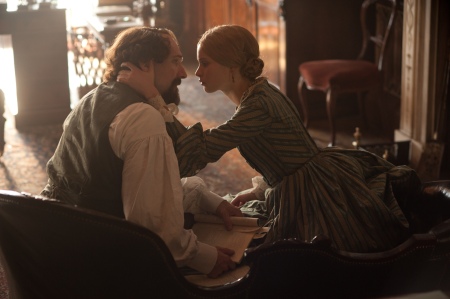“The Invisible Women”, directed by Ralph Fiennes who also portrays Charles Dickens, was one of the stronger films at the Telluride Film Festival, and deserved far more year-end attention.
Fiennes’ previous film as director was an intense update of Shakespeare’s “Coriolanus” set in a Balkan-like area in which he portrayed the title role. Before the screening of “Invisible Women”, Fiennes said that before making this film he had not been a fan of Dickens’ novels, having read only “Little Dorrit”. Fiennes added that His tastes ran more to Dostoyevsky.
The film begins in 19th century England as Nelly (Felicity Jones) is very involved in staging a production of a play by Charles Dickens at the school she and her husband run. Memories of Dickens cause her to take solitary walks on the sand in gloomy weather.
Nelly’s thoughts flash back about 15 years when she was an 18-year-old in a family of actors led by her celebrated mother (Kristin Scott Thomas, Fiennes’ “English Patient” co-star). Nelly Ternan meets the older, married (with many children) and very famous Charles Dickens and both are drawn to each other. Initially Nelly’s mother warns Dickens to stay away from her daughter so Nelly’s reputation can’t be risked in Victorian England. Eventually the mother becomes more encouraging of the connection when she realizes Nelly does not have the talent for a career on stage in the family business. Dickens and Nelly begin a long relationship.
As in his earlier “Coriolanus”, Fiennes brings a vivid sense of period, as well as an ensemble of actors giving subtle and complex performances. Fiennes is charismatic as Dickens, developing deep feeling for Nelly, but remaining concerned about keeping up the appearances of a literary celebrity in Victorian England. Jones is impressive as Nelly, giving two varied characterizations for the different periods of Nelly’s life. The younger Nelly is open to possibilities, when older, closed and secretive.
The screenplay by Abi Morgan (“The Iron Maiden”) presents a fascinating view of Victorian England where as long as appearances were publicly kept up, anything could happen behind closed doors without social retribution. Nelly can never be acknowledged as Dickens’ mistress. In one of the film’s best sequences, Dickens and Nelly are travelling together by rail. There is an accident. Though worried about Nelly’s condition, he is more concerned that the public not find out they were travelling together.
At an outdoor panel at Telluride, Fiennes said he did not have a lot of rehearsal for “The Invisible Woman.” He added that what was valuable was trust and bonding on the set. He said a director must remain alert.

